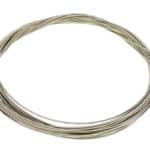Brands are so interesting.
We grew up with the idea that, if a product has been designed by a well-recognized brand, then the product is of high quality.
In the end, that idea leads to an increase in the brand’s reputation and earnings.
Are brands just a perception behind the product, or are the most important brands relevant because their products are actually good?
Well, we could be arguing about it for hours on end. We’ll do that, in fact.
However, we’ll not develop a thoroughly researched essay studying the importance of a client’s perception at the time of paying for a product.
We’ll just focus on the idea related to guitar strings brands.
We all know that Earnie Balls are, for example, one of the best string developers in the world… aren’t they?
Well, here’s the thing.
Guitar string brands don’t matter because they don’t add too much differentiation regarding sound or tone. Quality strings could last longer, but durability has to do more with how one plays the strings and how much they take care of them.
So, if the brand of a guitar string pack is not important, what aspects should you consider?
We’ll answer that question and much more in this article.
Are guitar string brands a real sign of quality?
The answer to this question is too tricky.
On the one hand, it’s safe mentioning that the most reputable string brands (EarnieBall, D’Addario, Fender, Gibson) develop quality strings.
On the other hand, though, a name stamped on a string package doesn’t make too much of a difference in the long run.
Naturally, what’s great about “quality” strings is that they will last longer. Moreover, they might keep their sound quality for extended periods of time, in comparison with poorly designed strings.
But this is just one aspect out of a dozen. When choosing guitar strings, there are other significant factors to consider, such as gauge, winding method, and the material it’s made of, just to name a few.
So, when choosing good strings, one mustn’t look for a distinguished name. It’s wiser to look for a set that fulfills one’s expectations regarding preferences in sound, feel, and playability.
So, to sum it up, string brands only guarantee quality regarding durability (and sometimes, not even that).
Does guitar string price correlate to quality?
Once again, price should always be measured regarding the musician’s expectations.
Are you willing to pay a high price just because X set of strings last longer than their competitors?
If that’s the case, then go for it! Maybe you save money in the long run, since the more a string last, the later you’ll have to buy a replacement.
Other than that, spending too much money on a brand just because it’s a renowned one is futile.
After all, price correlates to quality, but just to one aspect specifically.
In other words, there’s no point in buying expensive strings just because of the price.
They might be the best strings for those who want the heaviest gauge of them all (in that case, then the price correlates with the product).
However, what if you’re a beginner guitarist, and need a lighter gauge to get the hang out of the instrument?
Remember, price correlates with quality, but only regarding a very particular characteristic.
Buy a set of Earnie Balls only if you believe they will deliver a satisfactory result, not because someone else told you they are the best product in the market.
If you’re looking for the best uncoated strings, pay for expensive uncoated strings. Paying for coated strings, even if they are more expensive, won’t meet your expectations.
Are all guitar strings the same no matter brand or model?
Of course, not all strings are the same.
Brand, model, type, gauge, string core. All of those characteristics make each set unique.
In any case, you might find similarities between them.
However, it’s safe to mention that, on a bigger scale, the model or brand doesn’t make a huge difference in sound.
Differences between string brands and models
We cannot stress this enough: The string brand is not a relevant aspect to consider when choosing strings.
The difference may be too little to notice at all.
One could argue that, at the time of playing (that is to say, at the time of touching and getting into contact with the strings), there’s a different feel when comparing two or more brands.
Again, this could be the case for some people, but we cannot 100% agree with this fact.
Then, of course, there are differentiations between material, gauge, etc.
Also, certain strings are designed for acoustics, with others made for electric guitars.
Some are made of nylon, some made of steel and nickel, and others of bronze.
But all in all, the brand itself will rarely make a difference.
How to choose the best string set for you?
You must consider certain characteristics before buying guitar strings.
The very first aspect that should be looked upon is the string’s gauge.
The general rule is that the lighter the gauge, the easier it’s to bend and press the strings.
Evidently, the heavier the gauge, the harder and less flexible they are.
So, if you’re a beginner, for instance, then it is wiser to look for light gauge strings (0.08 or 0.09 approximately).
Nonetheless, if you’re learning from scratch but together with a band, and you want to play “heavier” music, then choose a gauge of 0.10 or 0.11.
It might be tough at first, but you’ll end up getting used to it. The thing is that heavy gauge strings provide a louder and fuller tone, while light string gauge does the opposite (brighter, more vivid tone).
Oh, sure. And consider whether you’ll play fingerstyle or with a pick.
Using a pick makes working with heavy gauge strings an easier job, so bear that aspect in mind.
Once you have decided on the gauge that suits your interest, it’s time to decide on the material.
The material the strings are made of plays a drastic significance in sound.
Flatwound strings create warmer sounds, steel strings’ tone is brighter, and nylon strings are mellower.
In any case, we encourage you to try the standard nickel-plated steel strings, which are the most common and versatile ones.
Lastly, we recommend asking for advice. It can be to a friend of yours, a luthier, someone at the guitar store, or a stranger on a forum.
What’s truly important, though, is to discover your own style as time passes by.
Experiment with as many strings types, brands, and models as you can. You’ll find out which string set is the right for you eventually.
How to decide between guitar strings sets of similar features?
Since guitar strings are not too dissimilar from one another, consider picking up a set that is neither too expensive nor too cheap.
If the set’s excessively economical, then its quality may be too low. And of course, highly expensive strings are not worth that much the amount of money.
So, either buy the one that will help your wallet a bit or just pick the set that you believe will be the best.
There are truly no wrong options.
Should you really be worrying about guitar string brands at all?
So, after a long article analyzing and describing why you should not worry about guitar string brands, we can conclude the following: You shouldn’t worry about guitar string brands at all.
I know, you weren’t expecting that, were you?
Well-known string models won’t make you sound better than non-recognized brands.
When talking about sound, remember that the gauge and the material the strings are made of are way more important than the brand itself.
If you have some extra bucks, and you want to purchase the best gear for your music, then we recommend investing in other items, such as pickups, effect pedals, or amplifiers.
String brand is, in the long run, unimportant.

Hello there, my name is Ramiro and I’ve been playing guitar for almost 20 years. I’m obsessed with everything gear-related and I thought it might be worth sharing it. From guitars, pedals, amps, and synths to studio gear and production tips, I hope you find what I post here useful, and I’ll try my best to keep it entertaining also.





